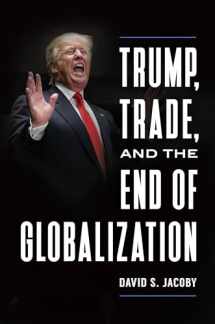
Trump, Trade, and the End of Globalization
Book details
Summary
Description
Provides a roadmap for mature industrialized countries to contribute to and benefit from global trade on new terms.
Global trade is heading toward chaos. Globalization has in part been a zero-sum game over the last 20 years, as China's middle and upper classes have grown sharply while Western economies have stagnated. Wealthy countries, most notably the United States and the United Kingdom, are now on the brink of abandoning free trade as it includes both the principles and the theories behind it because their economies cannot compete with those of China and some developing countries. Prevailing protectionist attitudes and policies are based on short-term thinking and will disappoint future generations.
According to author David S. Jacoby, a "new multilateralism" can provide a way out of this impending disaster by preserving innovation and growth while also curbing the impact of countries that manipulate currency, disparage the environment, and violate human rights. Jacoby clearly explains how industrialized nations can compete on a basis of differentiated technology and innovation while letting developing countries compete on a basis of manufacturing, components, and materials and makes a strong case for why the West should recommit to global trade.
• Explains the reasons behind current populist trends around the world
• Identifies the challenges and failures of globalization
• Profiles countries that have developed under different trade frameworks
• Assesses models of isolationism and protectionism
• Delivers a policy prescription for a new global trade order


We would LOVE it if you could help us and other readers by reviewing the book
Book review



